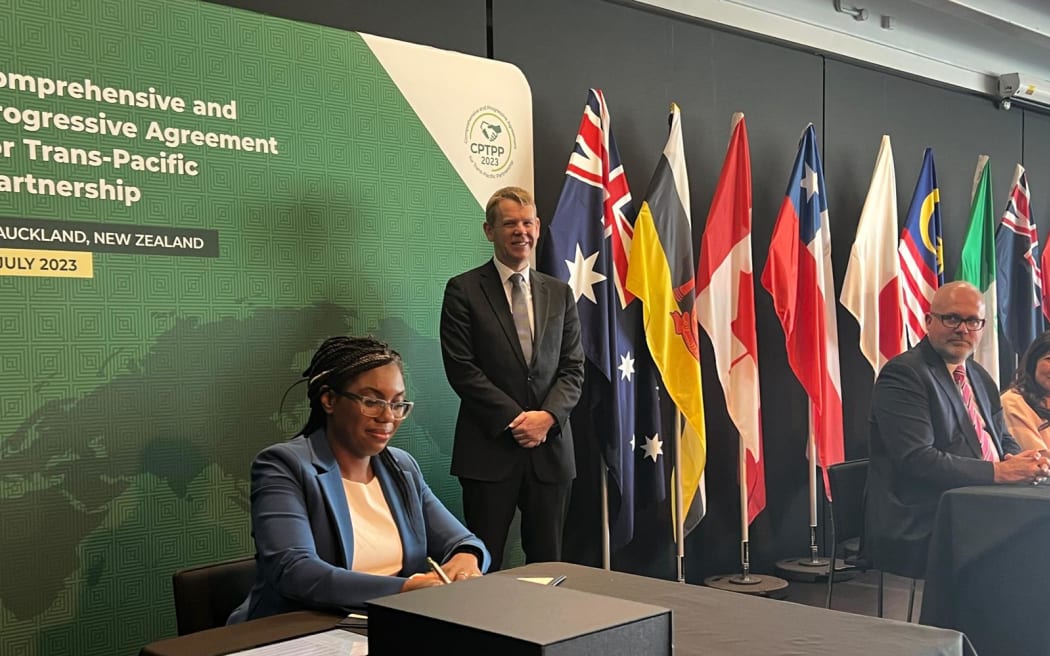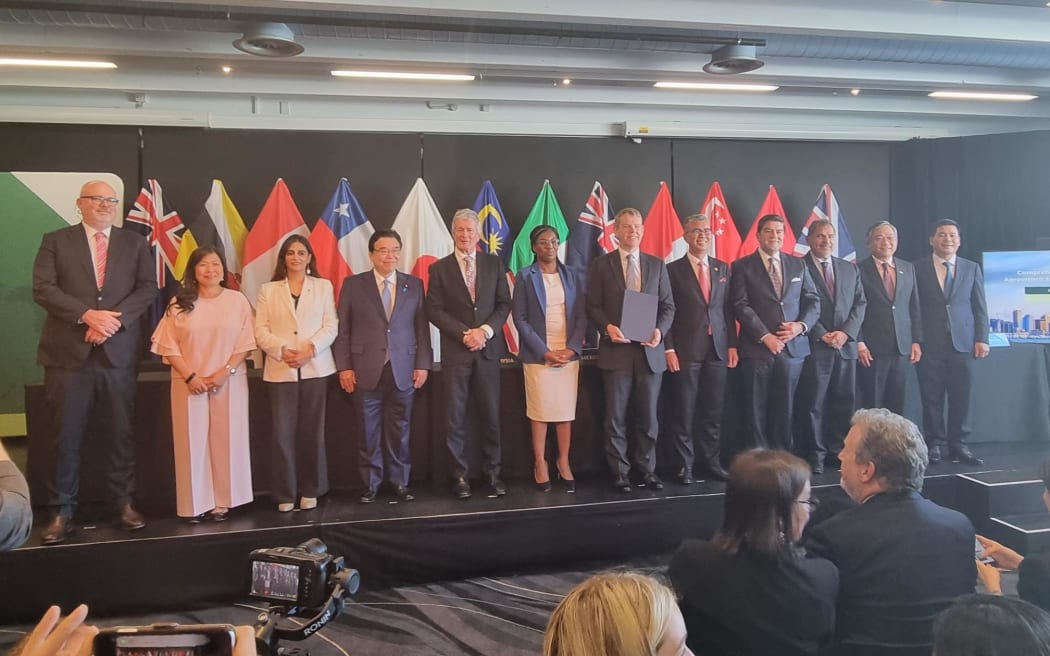No progress on new countries wanting to join trans-Pacific free-trade pact

The members of the Comprehensive and Progressive Agreement for Trans-Pacific Partnership have left their Auckland meeting bolstered by a new addition, and with a commitment to review the agreement first signed five years ago.
But no progress was made, nor any discussions had, on the applications of six other members, including China.
Ahead of what the government had touted as the biggest event it had hosted since the pandemic, ministers from 10 of the original signatories (New Zealand, Australia, Canada, Chile, Peru, Mexico, Japan, Vietnam, Singapore, and Malaysia - Brunei was absent, due to it being the Sultan's birthday), along with the United Kingdom, were welcomed to the event in Auckland with a pōwhiri.
The United Kingdom is the 12th country to sign up to the agreement, the first outside the Asia-Pacific, and the first outside the original 11 signatories.
Secretary of State for Business and Trade Kemi Badenoch signed the accession and called it an "historic day" for Britain.
While Britain's involvement means the CPTPP now represents 15 percent of the world's GDP, its involvement will barely make a mark on the UK's own GDP.
But the signing is strategic, and is still the biggest trade deal the UK has signed since Brexit.
"Our accession to CPTPP shows the world what the UK can achieve as an independent trading nation," Badenoch said.
Badenoch said the signing was so exciting it meant she had to leave the event early, without taking any questions from assembled media, in order to prepare for live interviews with Britain's Sunday morning news shows.
With a Free Trade Agreement already in force, the UK's admission to the CPTPP is not so much about the trade benefits it brings to New Zealand, but the potential more countries may want to join.
New Zealand International Business Forum executive director Stephen Jacobi said having another G7 country in the ranks strengthened the pact's appeal.
"It adds a major economy on to this sort of Fellowship of the Ring, if you like. And I think that the UK brings a lot to the agreement in terms of its commitment to open markets and free trade and investment. So all of that is to be welcomed," he said.
The members agreed the pact should be reviewed and updated, in the face of climate and energy challenges, as well as the digital economy.
Australia's Assistant Minister of Trade, Tim Ayres, said the terms of reference were yet to be worked through, but technology would be a focus.
"When the CPTPP and TPP and P4 agreements were first being negotiated, we didn't have 3G, let alone 4G or 5G, let alone Artificial Intelligence. It is important that as the technological and economic developments are coming at us very fast, we retain the capacity to evolve this agreement so that it continues to lead the world," he said.
Much was made of the "high standards" of the agreement, and a review could move the goal posts further for the six existing applications. China, Taiwan, Costa Rica, Ecuador, Uruguay, and Ukraine have officially signalled their interest in joining the pact.

Trade and Export Growth Minister Damien O'Connor said the process of the United Kingdom joining the CPTPP felt like the "trial run".
"There was much to learn from this process, it hasn't always been easy. So we need to make sure that we work through to improve the process to ensure that that others in line get a fair deal, but can show that they will meet the high standards and have a track record of meeting high standards that we have in our agreement."
Jacobi accepted some CPTPP members would have some reservations about China joining, but said the only reservation they should have is whether it could meet the standards.
"This one tends to have higher-level commitments in relation to the role of state-owned enterprises, for example. This is relevant, obviously, for China. It has tougher rules when it comes to the digital economy than many other agreements have, particularly around the need to preserve data flow and to promote cyber security and things like that. Again, complicated for China."
O'Connor would not mention any country by name, nor would he put a timeframe on applications. He said it was a "complex" area.
"I think most members see this agreement as a progressive one, and open to new aspirant economies that can meet the very high standards, and have a track record of meeting the high standards that each one of us is committed to," he said.
Any decision made regarding the agreement has to be by consensus. This includes membership, the agreement's terms, even its name.
With an Atlantic country joining the Trans-Pacific fold, and an admission the CPTPP name was hardly the easiest to say, Prime Minister Chris Hipkins said he would support a change if it came up.
"If there's a desire to name it something better, I would be very pleased about that, given the mouthful that it is."
But the name was not discussed at Sunday's meeting, meaning, for now, the Comprehensive and Progressive Agreement for Trans-Pacific Partnership it remains.